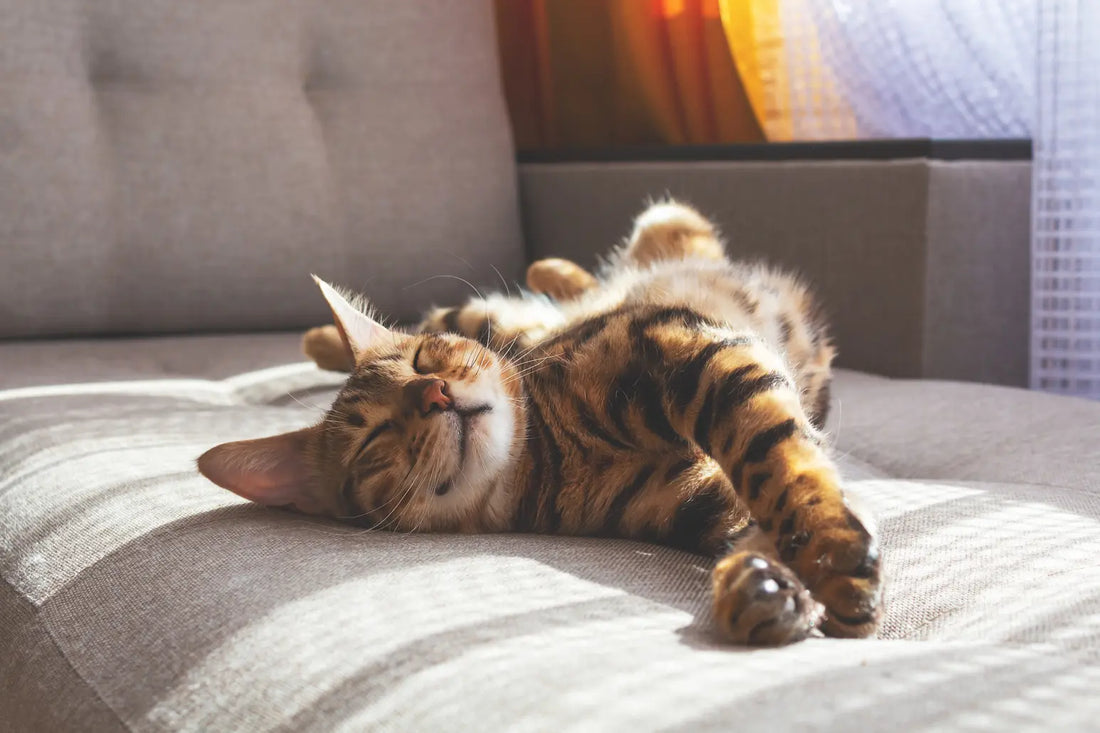
10 Tips for Keeping Your Home Clean from Outdoor Cat Gifts
Share
If you have an outdoor cat, keeping your home clean from outdoor cat gifts (dead or life mice or birds) can be a real challenge. Cleaning these messes is unpleasant, but it’s part of home maintenance for cats when you have a little hunter. You might be wondering how to clean your home after your cat brings dead animals indoors, and more importantly how to prevent outdoor cat mess indoors going forward.
Don’t worry: Here are 10 Tips giving you practical solutions and advice for cleaning up these surprises, so you can maintain a fresh, hygienic home.
Tip 1: Remove Prey Safely and Immediately
When your cat brings in a dead (or live) animal, remove it right away. Prey can carry bacteria or parasites that could make your cat or family sick. Use rubber gloves or a plastic bag over your hand to pick up the carcass, then double-bag it and dispose of it in a sealed outdoor bin. Always wash your hands thoroughly afterward.
Tip 2: Remove Attractants (Bird Feeders, Small Pets)
Don’t lure wildlife to your yard if you have a keen hunter. Remove or secure any bird feeders and similar attractants. For example, place feeders where your cat can’t reach them, otherwise your cat may turn feeding time into hunting time. Likewise, keep small pets (like rabbits or guinea pigs) in sturdy enclosures that your cat can’t access. And avoid leaving pet food or kitchen scraps outside, since they can attract mice or other prey animals. Fewer temptations in the yard mean fewer opportunities for your cat to hunt.
Tip 3: Provide Engaging Indoor Toys and Playtime
Indoor play can satisfy your cat’s hunting urge so they’re less tempted to stalk wildlife. Provide engaging toys (like feather wands or toy mice) and play with your cat daily to burn off energy. In one study, cats that had just 5–10 minutes of play per day ended up bringing home 25% fewer prey animals. Keeping your cat busy and tired out indoors means they’re less likely to roam outside searching for real prey.

Tip 4: Train Your Cat and Limit Outdoor Time
Limit your cat’s outdoor hunting opportunities. For example, bring them indoors during dawn and dusk when they tend to hunt most, to reduce chances of prey-chasing. If your cat does go out, consider using a breakaway collar with a bell. Research shows a bell can cut a cat’s hunting success by about 50%. This warning gives birds and other creatures time to escape, meaning fewer “gifts” for you.
Tip 5: Create an Enclosed Outdoor Space (Catio)
Give your cat a way to enjoy the outdoors safely. A catio – or “cat patio” – is an outdoor enclosure that keeps cats and wildlife safe. Catios offer cats healthy exercise time while keeping them safe from outdoor hazards such as cars, predators, and poisons source. With a well-built catio, your cat stays entertained outdoors and you won’t find any unwanted “gifts” inside.
Tip 6: Clean and Disinfect Affected Areas
After disposing of your cat’s “gift,” be sure to clean up thoroughly. In fact, cleaning cat hunting gifts from your floor requires using a pet-safe cleaner or diluted bleach to wipe up any blood or fluids and kill bacteria. This sanitizes the spot and removes odors that might attract your cat again. Remember to throw away any soiled cleaning materials and wash your hands afterward.

Tip 7: Use ZeroMOUSE™ to keep your cat’s prey outside
If you already have a microchip cat flap, you can easily upgrade it with ZeroMOUSE™.
The built-in camera detects mice, birds, and other prey animals with over 99% accuracy. As soon as prey is detected, ZeroMOUSE™ sends a signal to your cat flap, which then locks immediately. This keeps your home clean and safe.
ZeroMOUSE™ is splash-proof, installs in just 5–10 minutes, and is compatible with all microchip cat flaps with a tunnel.
Try ZeroMOUSE™ now, risk-free, with our 60-day return policy!
Tip 8: Groom Your Cat Regularly
Regular grooming isn’t just about having a shiny coat, it actually helps keep your home cleaner. Brushing your cat not only removes loose fur and dirt but also gets rid of external parasites from their coat. The less dirt on your cat, the less it ends up around the house. Frequent brushing (especially for long-haired cats) also means less shedding, so you’ll find far less cat hair on your floors and furniture.
Tip 9: Secure Trash and Compost Bins
Keep your garbage and compost out of your cat’s reach. Curious cats may knock over trash cans or dig in compost, creating a mess. Use bins with tight-fitting lids or store them where your cat can’t access them. (For example, moldy compost can grow toxins that cause tremors or seizures in pets.) By securing your trash and compost, you also avoid attracting rodents or other pests that your cat might prey on.
Tip 10: Keep Up on Pet Health (Vaccines, Parasite Control)
Stay on top of your cat’s health care, it’s good for them and for your home. Make sure their vaccinations are up to date, since outdoor cats can encounter wild animals carrying dangerous diseases. Also follow a strict parasite prevention plan. Use flea and tick treatments regularly and deworm your cat on schedule. Veterinarians usually recommend deworming adult cats every 3 – 6 months, with even more frequent treatment for prolific hunters. A cat free of fleas, ticks, and worms won’t bring those pests into your house.

